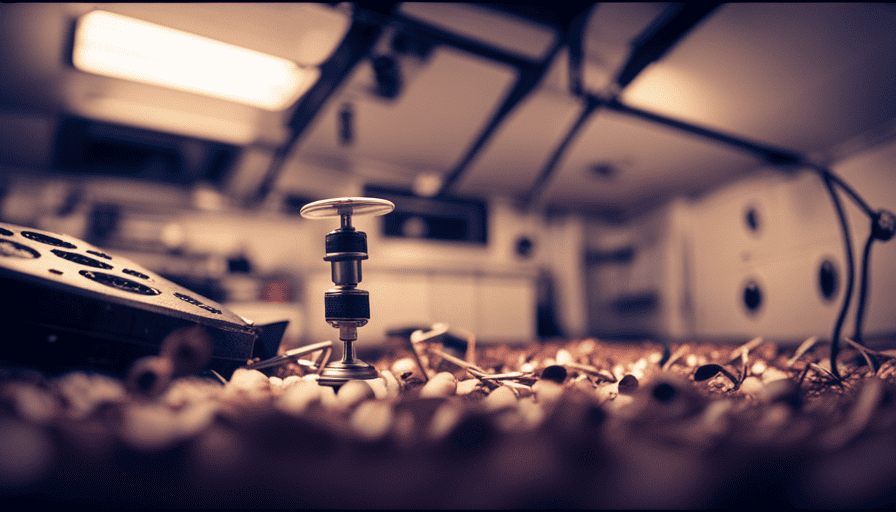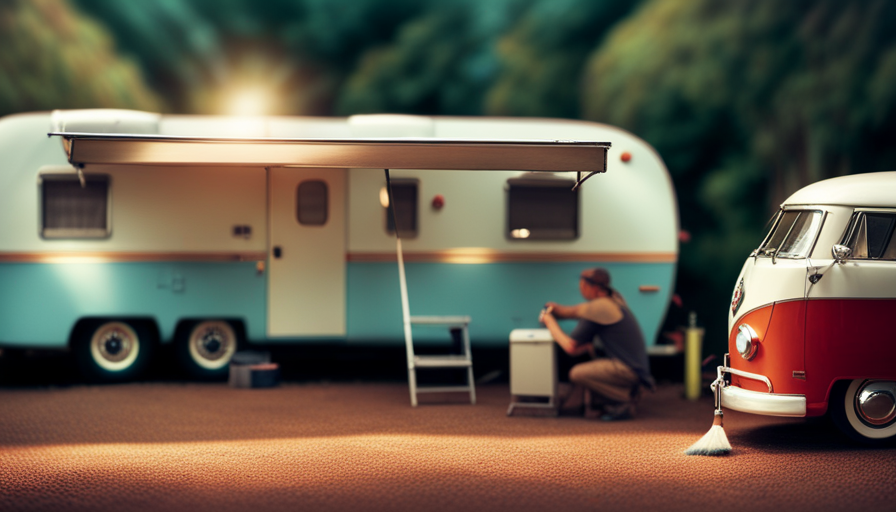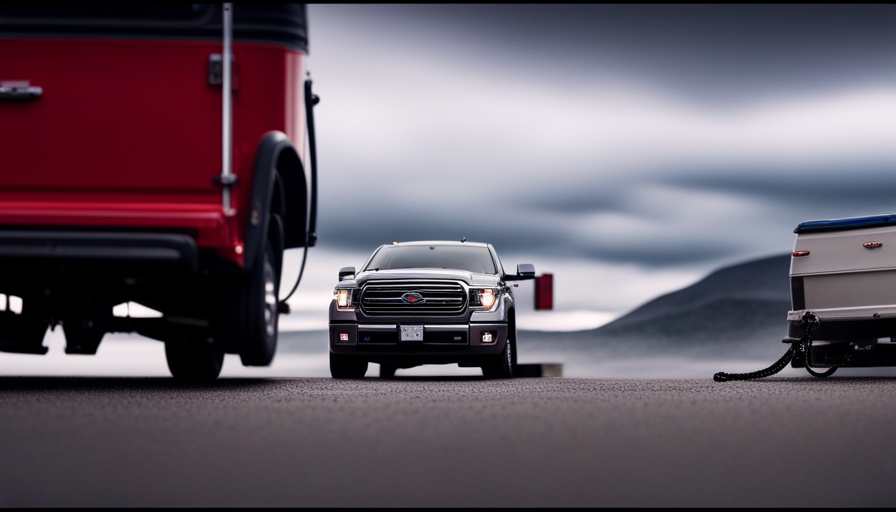Have you ever dealt with the annoyance of discovering mice in your RV? It can be a complete nightmare, with these pesky pests running around, leaving behind their droppings and possibly causing harm to your cherished escape.
But fear not, because I’m here to share some effective techniques to keep those pesky mice out of your camper. Just like the mythical Pied Piper, we’ll be using a variety of methods to lure those mice away from your camper and into the wilderness where they belong.
From sealing entry points to using natural deterrents like peppermint oil or mothballs, we’ll cover it all. We’ll also discuss the importance of regular cleaning and decluttering, storing food in airtight containers, and setting up traps or bait stations.
By following these practical tips, you’ll be able to enjoy your camper without the unwanted company of mice. So, let’s get started and keep those furry intruders out for good!
Key Takeaways
- Seal entry points with steel wool, expanding foam, or caulking.
- Trim tree branches and shrubs near the camper.
- Store food in airtight containers.
- Regularly inspect and repair damaged areas.
Identify and seal entry points
Alright, it’s time to find those sneaky little entry points and seal ’em up tight to keep those pesky mice out of your camper! To effectively keep mice out, you need to identify and seal any potential entry points.
Start by thoroughly inspecting your camper, paying close attention to gaps and cracks in the walls, floors, and ceiling. Use a flashlight and a mirror to help you see those hard-to-reach areas. Once you’ve identified these openings, it’s time to employ some sealing techniques.
Fill any small gaps with steel wool, as mice won’t be able to chew through it. For larger holes, use expanding foam or caulking to create a tight seal. Don’t forget to check the areas around pipes, vents, and windows, as these are common entry points for mice.
In addition to sealing techniques, there are preventive measures you can take to keep mice at bay. Trim any tree branches or shrubs that are touching or close to your camper, as mice can use them as a bridge to access your vehicle. Keep your camper clean and decluttered, as mice are attracted to food sources and nesting materials. Regularly sweep and vacuum, and ensure that all food is stored in airtight containers.
By implementing these sealing techniques and preventive measures, you’ll significantly reduce the chances of mice finding their way into your camper.
Now, let’s move on to the next section about how to clean and declutter your camper regularly.
Clean and declutter your camper regularly
Regularly cleaning and decluttering your camper will create a neat and organized space that discourages unwelcome rodent visitors. Regular cleaning helps eliminate any food crumbs or spills that may attract mice. Make sure to wipe down countertops, sweep the floors, and vacuum any upholstery or rugs.
Organizing and decluttering your camper will also help prevent mice from finding hiding spots. Remove unnecessary items and keep belongings properly stored and organized. Clutter provides mice with places to nest and hide.
In addition to regular cleaning and decluttering, proper waste disposal and maintenance are crucial in keeping mice out of your camper. Dispose of waste properly in sealed trash bags and empty trash cans regularly. Mice are attracted to the smell of garbage, so it’s important to keep it contained and remove it from your camper promptly.
By regularly cleaning, organizing, and decluttering your camper, you are creating an environment that is less appealing to mice. This will help deter them from entering and nesting in your camper. With a clean and organized space, you can now focus on the next step: storing food in airtight containers.
Store food in airtight containers
To maintain a pristine and pest-free environment within your camper, it is essential to store all food items in airtight containers. This simple step can make a significant difference in keeping mice away. When food is stored in airtight containers, it becomes inaccessible to pests, preventing them from being attracted to your camper.
Let’s explore some alternative storage options and their effectiveness in deterring mice. I have created a table below to help you compare different options:
| Storage Option | Effectiveness |
|---|---|
| Airtight containers | High |
| Ziplock bags | Medium |
| Plastic wrap | Low |
| Cardboard boxes | Very low |
| Tupperware | High |
As you can see, airtight containers are the most effective option. However, if you don’t have them on hand, using ziplock bags can still provide some level of protection.
While storing food properly is crucial, it’s also worth discussing homemade repellents. Some people claim that peppermint oil or mothballs can deter mice. However, their effectiveness may vary, and it’s important to consider the potential risks and drawbacks.
In the subsequent section, we will delve into the use of natural deterrents such as peppermint oil or mothballs to further protect your camper from mice.
Use natural deterrents such as peppermint oil or mothballs
Using natural deterrents like peppermint oil or mothballs can add an extra layer of protection against unwanted critters in your camper. Peppermint oil has been known to have numerous benefits and is commonly used as a natural pest control method. It’s strong scent is unpleasant to mice and can help keep them away from your camper. Simply soak cotton balls in peppermint oil and place them in areas where mice are likely to enter, such as near openings or corners. Replace the cotton balls every few weeks to maintain the effectiveness of the scent.
Mothballs are another natural deterrent that can effectively keep mice at bay. These small white balls contain chemicals that emit a strong odor unpleasant to rodents. Place mothballs in strategic locations throughout your camper to create a barrier against mice. However, it’s important to take caution when using mothballs, as they can be toxic to humans and pets. Make sure to keep them away from food, water, and areas where people or animals frequently occupy.
By incorporating these natural deterrents into your camper, you can discourage mice from entering and causing damage. However, it’s important to note that these methods alone may not be entirely effective in eliminating an existing mouse infestation. In the next section, we’ll explore additional measures such as setting up traps or bait stations to further deal with the issue.
Set up traps or bait stations
Ready to catch those pesky critters in your camper? Set up traps or bait stations to take control of the situation. Trapping methods and rodent-proofing techniques are essential to keep mice out of your camper and prevent further infestations. Here are some effective strategies to consider:
-
Snap traps: Place these classic traps along walls, near entry points, and in areas where you’ve seen mouse activity. Bait them with peanut butter or cheese to attract the mice.
-
Electronic traps: These traps use batteries to deliver a lethal shock when a mouse enters. They’re quick and efficient, ensuring a humane kill.
-
Glue traps: These adhesive boards capture mice when they step on them. Place them in areas where mice are likely to travel, but be aware that they may not kill the mice instantly.
To increase the effectiveness of your trapping efforts, consider these rodent-proofing techniques:
-
Seal entry points: Inspect your camper for any gaps or holes that mice could use to enter. Use steel wool or caulk to seal these openings.
-
Keep food sealed: Store all food items in airtight containers to prevent attracting mice.
-
Remove potential nesting materials: Now that you have your traps set up, let’s focus on removing any potential nesting materials to discourage mice from making themselves at home in your camper.
By following these trapping methods and rodent-proofing techniques, you’ll be well on your way to keeping mice out of your camper and enjoying a critter-free vacation. Transitioning into the next section, let’s discuss how to remove any potential nesting materials.
Remove any potential nesting materials
Now that you’ve set up your traps, let’s focus on tidying up any potential cozy spots that may attract unwanted guests. Preventing infestations is essential to keeping mice out of your camper. One way to do this is by removing any potential nesting materials.
Mice are resourceful creatures and will use anything they can find to build their nests. Therefore, it’s important to eliminate any materials that they might find appealing.
Start by thoroughly cleaning your camper and removing any clutter. Mice love to hide in piles of clothes, bedding, or cardboard boxes, so make sure to keep these items stored away properly.
Additionally, check for any holes or gaps in your camper’s interior and exterior walls. Seal them with steel wool or caulk to prevent mice from entering.
Rodent proofing techniques can also be employed to keep mice away. These include using wire mesh to cover vents and openings, installing door sweeps, and ensuring that all windows are properly screened.
It’s also a good idea to store food in airtight containers and to clean up any spills or crumbs promptly.
By removing potential nesting materials and implementing rodent proofing techniques, you can greatly reduce the likelihood of a mouse infestation in your camper. This will help to keep your camper well-ventilated and dry, ensuring a comfortable and pest-free camping experience.
Keep your camper well-ventilated and dry
To ensure a comfortable and pest-free camping experience, make sure your camper remains well-ventilated and dry. Proper ventilation is crucial in preventing moisture buildup, which can attract mice and other pests. Install screens on windows and vents to allow air to flow freely while keeping unwanted critters out.
Additionally, regularly inspect and repair any damaged areas of your camper’s exterior, such as cracks or gaps, as these can provide entry points for mice.
To ensure dryness inside your camper, it’s important to address any sources of moisture. Keep an eye out for leaks or water damage and promptly fix them to prevent dampness. Use dehumidifiers or moisture absorbers to reduce humidity levels inside the camper. Be sure to empty and clean these devices regularly to maintain their effectiveness.
Incorporating these measures will help maintain a well-ventilated and dry environment inside your camper, making it less attractive to mice. This will significantly reduce the likelihood of a rodent infestation.
In the next section, I’ll discuss how to use ultrasonic repellents to further deter mice from entering your camper.
Use ultrasonic repellents
Make sure you have an ultrasonic repellent installed in your camper to keep those unwanted critters at bay. Ultrasonic repellents are devices that emit high-frequency sound waves that are inaudible to humans but can be highly annoying to mice and other pests. These sound waves create a hostile environment for the pests, making them want to stay away from your camper.
Ultrasonic repellents have been proven to be effective in keeping mice out of campers and other enclosed spaces. They work by disrupting the rodents’ communication and breeding habits, making it less likely for them to infest your camper. However, it’s important to note that the effectiveness of ultrasonic repellents may vary depending on the size and layout of your camper, as well as the severity of the mouse infestation.
If you prefer alternative natural deterrents, there are a few options to consider. Peppermint oil, for example, has been known to repel mice due to its strong scent. You can soak cotton balls in peppermint oil and place them strategically around your camper to deter mice. Another option is using a mixture of vinegar and water as a spray. Mice dislike the strong smell of vinegar, so spraying it in areas where they may enter can help keep them away.
Remember, while ultrasonic repellents and natural deterrents can be effective, they may not completely eliminate a mouse problem. If you’re dealing with a severe infestation or if your efforts aren’t yielding the desired results, it’s best to seek professional pest control assistance. Their expertise and specialized methods can help ensure that your camper remains mouse-free.
Seek professional pest control assistance if needed
If you’re dealing with a severe mouse infestation in your camper, it’s time to call in the professionals for effective pest control assistance. While DIY pest control methods can be useful for minor infestations, they may not be sufficient for more serious cases.
Seeking professional help ensures that you get the expertise and resources needed to eliminate the mice from your camper. Professional pest control companies have the knowledge and experience to assess the extent of the infestation and develop a targeted treatment plan. They use a combination of techniques, such as traps, baits, and repellents, to effectively eradicate the mice and prevent future infestations. Additionally, they can advise you on preventive measures to keep your camper mouse-free in the long run.
By relying on professional assistance, you can save time, money, and frustration. They have access to professional-grade products that are more potent than those available to consumers. This means that they can tackle the infestation more efficiently, reducing the risk of further damage to your camper.
Regularly inspecting your camper for any signs of mice is crucial to maintaining a pest-free environment. By doing so, you can catch any potential infestations early and take appropriate action. This proactive approach will help ensure that your camper remains mouse-free, allowing you to enjoy your travels without any unwanted guests.
Regularly inspect your camper for any signs of mice
If the previous subtopic didn’t quite solve your mouse problem, it might be time to take matters into your own hands. Regularly inspecting your camper for any signs of mice is a crucial step in preventing a full-blown infestation.
Mice are sneaky little creatures, so it’s important to be thorough in your inspections. Start by checking the exterior of your camper for any cracks, holes, or gaps that could serve as potential entry points. Mice can squeeze through even the tiniest openings, so be sure to seal up any vulnerabilities with steel wool or silicone caulking.
Next, move inside and carefully examine all areas where food is stored, such as cabinets and pantries. Look for droppings, chewed food packaging, or any other signs of their presence.
Additionally, pay close attention to your camper’s wiring and insulation. Mice love to gnaw on electrical wires, which can not only cause damage but also pose a fire hazard. Inspect these areas regularly and consider using rodent-proof materials if necessary.
By diligently inspecting your camper for signs of mice and taking preventative measures, you can keep these unwanted guests at bay and enjoy a pest-free camping experience.
Frequently Asked Questions
Are there any specific types of entry points that mice commonly use to get into campers?
When it comes to keeping mice out of your camper, it’s important to know the common entry points these critters use. One interesting statistic to consider is that mice can fit through holes as small as a dime! To combat this, consider using types of mouse traps like snap traps or electronic traps.
Additionally, the best way to seal entry points is by using steel wool or caulk to fill any cracks or gaps in your camper’s exterior.
How often should I clean and declutter my camper to effectively keep mice away?
To effectively keep mice away, it’s important to clean and declutter your camper regularly. This helps eliminate potential hiding spots and food sources that attract mice. I recommend cleaning and decluttering at least once a week.
When storing food in your camper, it’s best to use airtight containers specifically designed to keep out pests. Regular plastic containers may not provide enough protection against mice and other critters.
Can I store food in regular plastic containers, or do I need to use airtight containers specifically?
I recommend using airtight containers to store food in your camper. Regular plastic containers may not provide a sufficient seal, allowing mice to easily access your food. Airtight containers create a barrier that helps keep pests out and maintain the freshness of your food.
While regular containers may be cheaper, they don’t offer the same level of protection. Investing in airtight containers is a practical way to prevent mice and preserve your food while camping.
Are there any other natural deterrents besides peppermint oil or mothballs that can be effective in keeping mice away?
My go-to figure of speech is ‘like a moth to a flame.’ When it comes to alternative deterrents, there are natural mouse repellents that can be effective in keeping mice away.
Besides peppermint oil and mothballs, you can try using essential oils like eucalyptus or lavender, or even plants like mint or sage. These natural options can help keep those pesky critters at bay without the need for harmful chemicals.
How frequently should I inspect my camper for signs of mice, and what are some common signs to look out for?
I inspect my camper for signs of mice every week to catch any potential infestations early. Common signs of mice in campers include droppings, gnaw marks on wires or wood, shredded paper or fabric, and a musky odor.
To prevent mice from entering, I use natural deterrents like peppermint oil, mothballs, and steel wool to seal any entry points. Regularly cleaning and removing food sources also helps to keep mice away.
Conclusion
So, that’s how I keep mice out of my camper. By identifying and sealing entry points, keeping the camper clean and decluttered, storing food properly, using natural deterrents, setting up traps, and maintaining good ventilation, I’ve been able to keep those pesky critters away.
One interesting statistic is that mice can squeeze through a hole the size of a dime, so it’s important to thoroughly inspect your camper for any potential entry points.
With these practical tips, you can enjoy your camper without any unwanted furry visitors.










